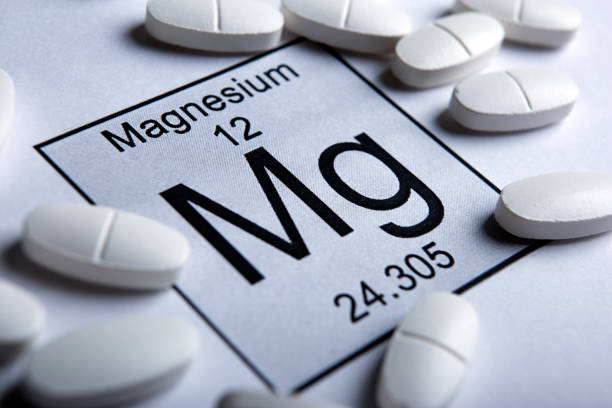Magnesium for Menopause
Magnesium for Menopause is a characteristic natural cycle that denotes the finish of a lady’s conceptive years, regularly happening in her late 40s or mid-50s. This momentary stage achieves different hormonal changes, prompting side effects like hot blazes, temperament swings, and rest aggravations, and that’s only the tip of the iceberg. While Menopause is a typical piece of maturing, its related side effects can fundamentally influence a lady’s satisfaction. As of late, there has been developing interest in other options and standard ways to deal with overseeing menopausal side effects. One such component that has acquired consideration is Magnesium.

The Job of Magnesium for Menopause in the Body
Magnesium for Menopause is a fundamental mineral that is essential to different physiological capabilities. It is associated with north of 300 enzymatic responses in the body, impacting everything from energy creation to muscle capability and bone well-being. Despite its significance, numerous people, including menopausal ladies, may not get a satisfactory measure of Magnesium from their eating regimen alone.
Lack of Magnesium and Menopause
As ladies go through Menopause, hormonal changes can add to the lack of Magnesium. Moreover, way of life factors like less than stellar eating routine, stress, and certain drugs can additionally drain magnesium levels. Lack of Magnesium has been connected to a scope of medical problems, including muscle issues, weariness, and state of mind unsettling influences, which can all be exacerbated during Menopause.
Easing Menopausal Side Effects with Magnesium
Hot Glimmers and Night Sweats: Hot blazes are a trademark side effect of Menopause, causing unexpected sensations of warmth, flushing, and perspiring. Magnesium might assist with controlling internal heat levels and diminish the recurrence and force of hot glimmers. Integrating magnesium-rich food sources or enhancements into the eating routine may help.
Mood Swings and Gloom: The hormonal variances during Menopause can add to the state of mind swings and an expanded gamble of melancholy. Magnesium plays a part in synapse capability and temperament guidelines. Sufficient magnesium levels assist with settling temperament and easing side effects of nervousness and despondency.
Bone Well-being: Osteoporosis turns into a worry for some ladies who present Menopause due to declining estrogen levels. Magnesium is essential for bone well-being, working with calcium to maintain bone thickness. Guaranteeing a sufficient admission of Magnesium can add to bone health during and after Menopause.
Types of Magnesium for Menopause Help
While considering magnesium supplementation for menopausal side effects, picking the correct type of Magnesium is fundamental. A few typical structures include:
Magnesium Citrate: This structure is consumed by the body and frequently utilized for its purgative impacts. It might assist with mitigating blockage, a typical issue during Menopause.
Magnesium Glycinate: Known for its high bioavailability, magnesium glycinate is a delicate choice less inclined to cause stomach-related uneasiness. It is a fantastic decision for those with touchy stomachs.
Magnesium Oxide: While magnesium oxide has a higher magnesium content, it is less bioavailable and may cause gastrointestinal issues. It is suggested that people need higher magnesium portions for explicit well-being concerns.

Dose Proposals and Security Contemplations
Before integrating magnesium supplements into a menopausal administration plan, it’s pivotal to talk with a medical care professional. They can assist with deciding the suitable dose given individual requirements and well-being status. While Magnesium is, for the most part, viewed as protected, extreme admission can prompt runs and other stomach-related issues. Finding the proper equilibrium is vital to receiving the rewards without unfriendly impacts.
Magnesium-rich food varieties for Menopause
Notwithstanding supplements, menopausal ladies can support their magnesium intake through dietary sources. Some magnesium-rich food sources include:
Leafy Greens: Spinach, kale, and Swiss chard are astounding sources of Magnesium and provide extra supplements beneficial to bone well-being.
Nuts and Seeds: Almonds, pumpkin seeds, and sunflower seeds are rich in Magnesium, good fats, and protein.
Whole Grains: Quinoa, earthy-colored rice, and entire wheat are great wellsprings of Magnesium and other fundamental supplements.
Legumes: Beans, lentils, and chickpeas are magnesium-rich plant-based protein choices appropriate for menopausal ladies.
Final Words about Magnesium for Menopause
All in all, Magnesium holds a guarantee as a characteristic and open choice for overseeing different side effects related to Menopause. From hot glimmers to state of mind swings and bone well-being, the other advantages of Magnesium make it an essential addition to a comprehensive menopausal consideration plan. In any case, moving toward magnesium supplementation with alertness and looking for direction from medical care experts to guarantee protected and successful use is vital.
As the examination continues to investigate the connection between Magnesium and Menopause, ladies exploring this groundbreaking stage can investigate the possible advantages of integrating magnesium-rich food varieties and enhancements into their everyday schedule. With the correct methodology, Magnesium might offer a characteristic and engaging answer for ladies seeking help from the difficulties of Magnesium for Menopause.

FAQs about Magnesium for Menopause
Can magnesium supplements truly assist with menopausal side effects?
Indeed, Magnesium has shown promise in easing different menopausal side effects. Research recommends that Magnesium can assist with managing internal heat levels, decreasing the recurrence and force of hot glimmers. Moreover, Magnesium’s role in temperament guidelines might contribute to overseeing emotional episodes and the side effects of misery during Menopause.
How much Magnesium would it be a good idea for me to take for menopausal help, and is it safe?
The suggested dose of Magnesium for menopausal alleviation can shift depending on individual requirements and well-being status. Talking with a medical care professional to decide the fitting measurement is vital. While Magnesium is, for the most part, thought to be protected, unnecessary admission can prompt stomach-related issues like looseness of the bowels. Finding the correct offset through a conference with a medical services supplier is fundamental.
Are there explicit kinds of magnesium supplements suggested for menopausal ladies?
Indeed, picking the correct type of Magnesium is urgent. Magnesium citrate, magnesium glycinate, and magnesium oxide are typical choices. Magnesium citrate is retained and valuable for the stoppage, while magnesium glycinate is delicate in the stomach. Magnesium oxide has a higher magnesium content but is less bioavailable and may cause stomach-related discomfort.
Could I get sufficient Magnesium from my eating regimen at any point, or do I want supplements?
While magnesium-rich food varieties are beneficial, numerous people, including menopausal ladies, may struggle to get a sufficient measure of Magnesium from diet alone. Factors like unfortunate dietary decisions, stress, and certain medications can contribute to a lack of Magnesium. In such cases, enhancements might be suggested after talking with a medical care professional.
What are the best food wellsprings of Magnesium for menopausal ladies?
Phenomenal dietary wellsprings of Magnesium for menopausal ladies incorporate mixed greens, for example, spinach and kale, nuts and seeds like almonds and pumpkin seeds, entire grains including quinoa and earthy colored rice, and vegetables like beans and lentils. Integrating these magnesium-rich food varieties into your eating regimen can supplement an all-encompassing way to deal with Magnesium for menopause side effects.
